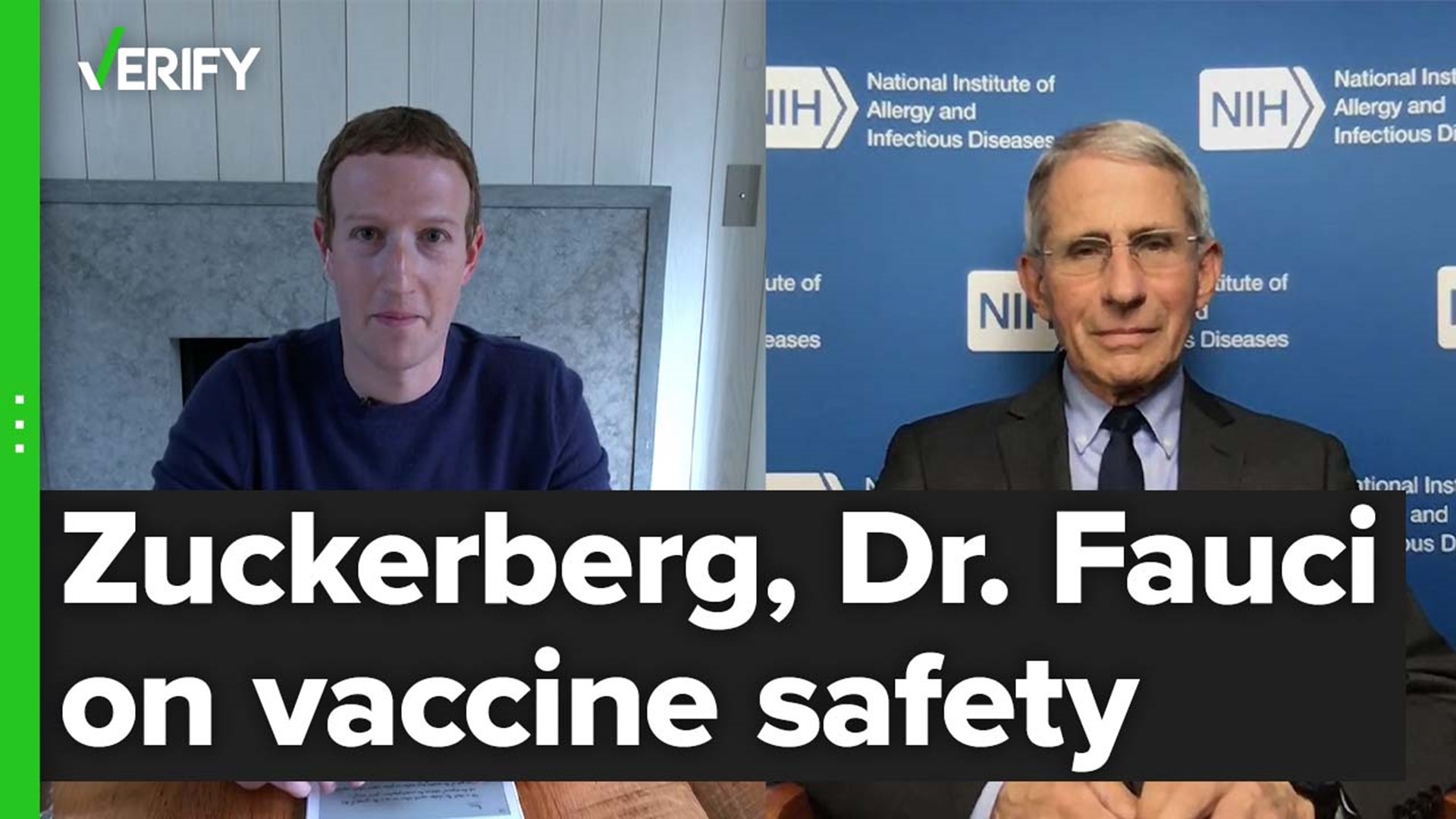Dr. Anthony Fauci, director of the National Institute of Allergy and Infectious Diseases and White House chief medical adviser, sat down with Mark Zuckerberg in March 2020 to talk about the state of the COVID-19 pandemic.
Twitter users on Dec. 13 were sharing a video with claims that Fauci told Zuckerberg regarding the COVID-19 vaccine: “This would not be the first time, if it happened, that a vaccine that looked good in initial safety actually made people worse.” The video had more than 830,000 views across Twitter as of Dec. 14.
THE QUESTION
Did Dr. Anthony Fauci tell Mark Zuckerberg the COVID-19 vaccine would make people worse?
THE SOURCES
THE ANSWER
Only a short clip of a longer video was shared, and it was taken out of context. Dr. Anthony Fauci was telling Mark Zuckerberg why it’s important to test vaccines for safety in March 2020, before the actual COVID-19 vaccines had been developed. Fauci was not saying the COVID-19 vaccines would make people worse.
WHAT WE FOUND
Mark Zuckerberg went live on Facebook in March 2020 with Dr. Anthony Fauci to discuss what individuals could do to slow the spread of COVID-19 in the early days of the pandemic.
During the sit-down with Fauci, Zuckerberg asked multiple questions, including some from the livestream comments. Twenty-four minutes into the video, Zuckerberg asks about vaccines.
A transcript from that portion of the interview is here:
Zuckerberg: “One of the questions I’ve heard from a number of people is: Doing the safety trials obviously is incredibly important because you want to make sure you’re not injecting people with something that could be harmful. But once you have that, why not push harder on rolling it out more aggressively, even if you don’t know how effective it is? What’s the public health rationale and thinking behind needing to prove it’s extremely effective before rolling out something that you know is safe?”
Fauci: “OK, That’s a good question. The initial safety study, Mark, is to see if I inject it in the arm, does it have some sort of idiosyncratic or bad reaction? There is another element to safety, and that is if you vaccinate someone and they make an antibody response, and then they get exposed and infected, does the response that you induce actually enhance the infection, and make it worse?
And the only way you’ll know that is if you do an extended study, not in a normal volunteer who has a risk of infection, but in people who are out there in a risk situation. This would not be the first time if it happened that a vaccine that looked good in initial safety actually made people worse.
There was the history of the respiratory syncytial vaccine in children, which paradoxically made the children worse. One of the HIV vaccines that we tested several years ago actually made individuals more likely to get infected. So you can’t just go out there and give it unless you feel that in the field, when someone is getting infected and exposed, being vaccinated doesn’t make them worse. That is why you got to do a trial.”
This portion of the interview ended at just around the 26-minute mark.
Fauci was not telling Zuckerberg the COVID-19 vaccine would make you more likely to get infected with COVID-19, or get worse, as Twitter users claimed. Rather, he was saying historical evidence has shown the importance of safety testing any vaccine before releasing it on the market.
The Centers for Disease Control and Prevention website lists side effects of taking the COVID-19 vaccine; none include increased chance of getting infected.
According to the CDC, people who were unvaccinated had a greater risk of testing positive for COVID-19 and a greater risk of dying from COVID-19 than people who were fully vaccinated. Pfizer-BioNTech received the Food & Drug Administration’s fastest approval of any vaccine and has a 91.3% efficacy against COVID-19.
Moderna has a 94% efficacy against COVID-19 and the J&J/Janssen single-dose COVID-19 vaccine is 66.3% effective against the virus, the CDC says.
As previously reported by VERIFY, the COVID-19 vaccine doesn’t cause or create new COVID-19 variants.
More from VERIFY: Fact Sheet: COVID-19 omicron variant

